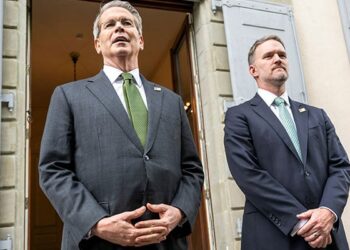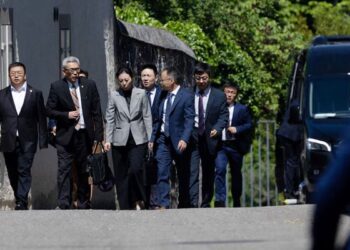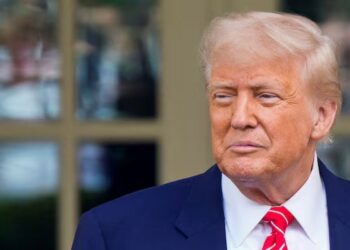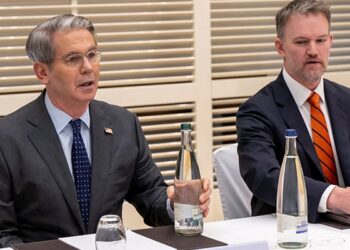- Li Chenggang succeeds seasoned trade negotiator Wang Shouwen.
- Wang had served as China’s main trade negotiator since 2022.
- The U.S. insists that China should take the lead in any trade negotiations.
In a surprising move on Wednesday, China appointed a new lead trade negotiator crucial for discussions aimed at resolving the growing tariff conflict with the United States. Li Chenggang, the country’s representative to the World Trade Organization (WTO), replaces veteran negotiator Wang Shouwen.
Li, 58 years old, previously served as an assistant commerce minister during Donald Trump’s first term as U.S. President. He takes the reins from Wang, who is 59, according to a statement issued by the Ministry of Human Resources and Social Security.
It remains unclear whether Wang, who took on the No. 2 position at the commerce ministry in 2022, has moved to another position within the government. His name is no longer listed among the ministry’s leadership, as per the ministry’s official website on Wednesday.
The ministry did not immediately respond to a request for comment from Reuters regarding this unexplained change.
A source within Beijing’s international business community described Wang as a tough negotiator, known for having had confrontations with U.S. officials in past meetings. “He was quite intense and aggressive,” said the source, who wished to remain anonymous.
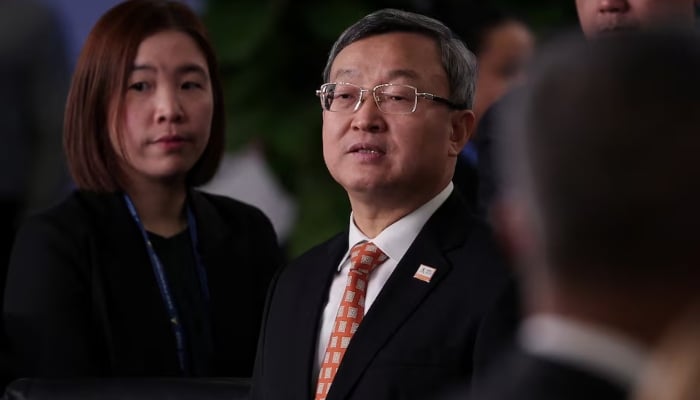
This leadership transition within the commerce ministry comes as Beijing takes a hardline approach in the escalating trade conflict with Washington, sparked by Trump’s significant tariffs on goods imported from China.
The unexpected change coincides with President Xi Jinping’s tour of Southeast Asia, aimed at strengthening economic and trade relations with nearby countries amid ongoing tensions with the U.S.
Commerce Minister Wang Wentao was present alongside Xi during his recent visits to Vietnam, Malaysia, and Cambodia.
Alfredo Montufar-Helu, a senior advisor at the Conference Board’s China Center, remarked that the change seems “very abrupt and potentially disruptive,” especially given how quickly trade tensions have intensified, and considering Wang’s extensive experience in negotiations with the U.S. since the onset of Trump’s presidency.
“We can only speculate on the reasons behind this timing, but it could be that China’s leadership believes a new face is necessary to break the current impasse and initiate meaningful negotiations,” he stated.
In contrast to many other countries that have sought to negotiate bilateral agreements with Washington in light of Trump’s tariff plans, Beijing has responded by increasing tariffs on U.S. goods and has not pursued talks, asserting that discussions must be rooted in mutual respect and equality.
On Tuesday, Washington indicated that Trump is open to a trade agreement with China, but emphasized that the responsibility lies with Beijing to initiate the process, asserting that “they need our money.”
‘Tariff shocks’
During a February meeting at the WTO in Geneva, Li criticized the U.S. for unilaterally imposing tariffs on its trade partners, including China, stating such actions have resulted in “tariff shocks” worldwide.
“The U.S. unilateral approach blatantly violates WTO regulations, heightens economic uncertainty, disrupts global trade, and has the potential to undermine the multilateral trading system. China firmly opposes this and calls on the U.S. to reverse its erroneous practices,” he stated.
Li, who holds significant experience in various capacities within the commerce ministry, including in areas related to treaties and trade law, has academic credentials from Peking University and Hamburg University in Germany.
“Li appears to be a classic Chinese technocrat with extensive experience in trade matters, both at the commerce ministry and the WTO,” said Alfred Wu, an associate professor at the National University of Singapore.
While the transition seems like a standard promotion, it is taking place during a sensitive period of heightened tensions between the U.S. and China.
On March 31, Li was recognized as a “leader” of the commerce ministry at a forum for Chinese private entrepreneurs, marking one of the first official signals regarding his impending new role.


